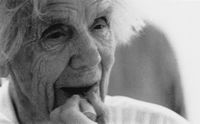
|
 |
In
the House of Angels
Dei Mjuke Hendene
|
NORWAY / 1998 / Norwegian / Color / 35mm (1: 1.66) / 97 min
Director, Script: Margreth Olin
Photography: Svein Krøvel
Editing: Helge Billing
Music: Mike Scott (The Waterboys)
Sound: Ragnar Samuelsson, Håkon Lammetun
Producer: Thomas Robsahm
Production Company: Speranza Film AS
Source: Norwegian Film Institute
World Sales: d.net.sales
Karwendelstr. 21, 12203 Berlin, GERMANY
Phone: 49-30-84306168/ Fax: 49-30-84306167
E-mail:majade@t-online.de
 |
|
Margreth Olin
Born in 1970 in Stranda, Sunnmøre. Studied at Universities of
Oslo and Bergen, and took a degree in film and television production
from Volda Regional College, specializing in documentaries. Co-owner
of Speranza Films AS. Made her directorial debut, In the House
of Love, in1994. Her award-winning My Uncle (1997) was
nominated for an Amanda at the Norwegian International Film Festival
in 1998. In the House of Angels is her first theatrical release.
 |
The issue of how a person is able to pass through old age is, ultimately,
bound to the question of how that person's life goals are realized.
This is a difficult theme, conforming to personal point of view, encompassing
such questions as social environment, religion and philosophy, and
answers cannot easily be put forth. The one thing that can be said
is that, after all, at the end of someone's life it is ideal to be
able to ready the surroundings in accordance with that person's wishes.
And yet the reality of it is harsh. In the House of Angels
is set in a home for the elderly in Norway. The film records Einar,
a man who lives there. For various reasons he is living separately
from his wife, who also lives in the rest home. This is unsatisfactory
to the couple who have spent sixty years of married life together.
There is a profound gap between the wishes of those living in the
home and the actual environment there.
The young director Margreth Olin, born in 1970, observes and films
the fine details of the lives of the elderly from an unsentimental
point of view. From start to finish, it is as though we are watching
a drama. Finally, a personal but universal question is quietly but
forcefully posed: To what extent can senior welfare offer those concerned
places of tolerance? [Watabe Minoru]
Director's
Statement
Why do people living in one of the richest countries of the world
see their nation as poor? I have a theory.
Since we no longer know WHY we live, HOW we live becomes most important.
The lack of God, if you want. Lack of spirit. Lack of reason.
Why are we here?
I am searching for symptoms. In the House of the Angels is one. We
place old people in institutions. They are given small rooms with
numbers on the doors. Death and old age are our last taboos.
What makes us human - our dreams, hopes, visions - we take with us to
the grave. This should be the inheritance from our grandparents, the
treasure being our roots.
What inheritance do the Norwegians carry with them?
I made this film to give old age a face - old age in all its splendor.
I believe film can make people reflect, and put new content to words
like community, love, family and hope.
When I saw Wiseman's films I decided not to become a farmer, but a
filmmaker. I thought that if I can achieve moments of emotional truth
like this, life will be meaningful. It will be a WHY, not a how. In
the House of Angels is pointing at how we treat old people. Maybe
that can explain the lack of WHY? |
  |
|
before  next next |
COPYRIGHT:Yamagata International Documentary Film Festival Organizing Committee |